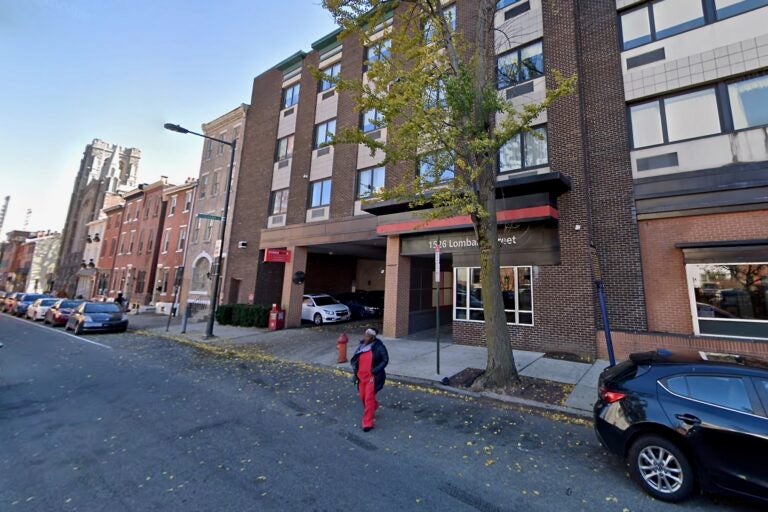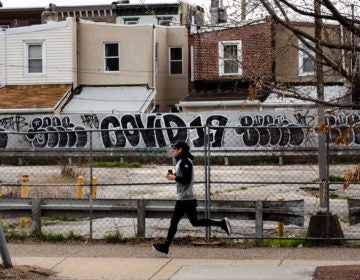A risky but possibly lucrative mix: Nursing homes and COVID-19 patients
Canceled elective procedures mean many facilities are no longer getting short-term residents paid for by Medicare. Medicaid pays less for long-term care.

Powerback Rehabilitation in Center City Philadelphia. (Google Maps)
Under financial strain, some nursing homes in the region may start to admit stable COVID-19 patients who require ongoing care as they are discharged from hospitals.
That’s despite the fact that these facilities also house the population for whom the disease is most deadly.
Center City-based PowerBack Rehabilitation, operated by Genesis HealthCare, confirmed Wednesday that it had begun admitting COVID-19 patients released from hospitals to a floor dedicated just for them. Its location in Piscataway, New Jersey, will follow the same model.
PowerBack’s Philadelphia location is also home to dozens of long-term care patients, though a representative for the company would not confirm how many.
COVID-19, the disease caused by the coronavirus, spreads easily within nursing homes because staff members move from bedside to bedside and patients often leave their buildings for necessary daily treatment such as dialysis. Once it’s in, the disease is particularly deadly: About half of the COVID-19 deaths thus far in Philadelphia and Pennsylvania, for example, have been among nursing-home residents.
Because of that, most nursing homes across the country are still trying to deny entry to COVID-19 patients.
Not PowerBack. The company’s executives said the shift is to help overburdened hospitals.
“At this time, local hospitals have dozens of stable COVID-19 patients, but have been unable to discharge them to post-acute rehabilitation facilities for the duration of the virus,” PowerBack’s chief medical officer, Richard Feifer, said in a statement.
As of Thursday, however, Philadelphia’s hospitals were roughly one-third empty, according to city Health Commissioner Thomas Farley. He said the numbers continue to grow, and some hospitals are fuller than others. Meanwhile, Temple’s Liacouras Center, designed specifically to accept stable COVID-19 patients being discharged from the hospital, accepted zero patients on its opening day.
The incentive for nursing homes to take these patients is, in part, a financial one.
“There’s been this concern that there’s certain facilities that want to do this because it’s going to be very lucrative and they need these dollars,” said David Grabowski, a professor of health care policy at Harvard Medical School. “Not every nursing home should be a COVID-positive specialized nursing home.”
Short-term care vs. long-term care
Nursing homes generally care for two types of patients. The first are long-term residents, commonly thought of as a typical nursing home patient: Someone who is likely going to be there for the rest of their life, who requires a lot of assistance in daily living such as bathing and dressing. These individuals often have serious cognitive impairment, or dementia. This group is insured by Medicaid.
The other type of patient stays for a shorter time, usually after surgery or a procedure in the hospital. These patients require short-term therapy for no more than 100 days, and most are home within a month.
This second group is covered by Medicare, whose reimbursement rates are much higher. Revenues for short-term patients are in the double digits over costs. The long-term Medicaid residents, however, often lose money for the facility.
“It’s really hard to run a nursing home if you largely care for Medicaid residents,” said Grabowski. He noted that, nationwide, short-term residents make up only 13% of the overall nursing home bed days per year, essentially subsidizing their other services.
But as hospitals have suspended elective surgeries to make space for coronavirus patients, there are no patients getting hip replacements or knee surgeries anymore. That means those more lucrative patients aren’t coming through the nursing homes with their Medicare dollars, either, thus threatening the financial status of the institutions.
“Nursing homes are struggling right now,” said Grabowski. “On the Medicare side, the dollars have largely dried up.”
In the coming weeks, Grabowski said, he anticipates more nursing homes will feel pressure to accept short-term COVID patients from the hospitals. In part, that could be one way for institutions like PowerBack to restart their revenue stream, since COVID patients would be reimbursed at the higher, Medicare rate.
Though it might be also in service of overburdened hospitals, the question is, at what cost?
Which nursing homes, and where?
While some facilities are equipped to care for COVID-19 patients, others simply aren’t, said Grabowski, noting that it’s up to state regulators to choose which ones are well suited for the job.
After WHYY reported earlier this week that PowerBack planned to accept COVID patients from the hospitals, the City of Philadelphia updated its guidance to long-term care facilities, instructing them not to take COVID-19 patients from the hospital. On its website, it wrote:
“Given Philadelphia’s current hospital capacity and the fact that 50% of the city’s COVID-19-related deaths have been among residents of long-term care facilities, we recommend that patients with COVID-19 not be admitted or readmitted to nursing homes until either 1) at least 14 days after the onset of symptoms or 2) 7 days after the onset of symptoms, fever free for 72 hours without antipyretics and respiratory symptoms (if any) are improving AND a COVID-19 test performed at least 7 days after the onset of symptoms (or initial positive test if asymptomatic) is negative.”
But the city doesn’t have any regulatory power over these facilities — that’s the state’s job. The Pennsylvania Health Department guidance still instructs long-term care facilities to accept COVID-19 patients from hospitals, as long as they follow proper isolation protocols.
A department spokesman would not indicate how many facilities were doing this. The department is also encouraging facilities to keep positive patients together in a separate area.
In New Jersey, nursing homes are not allowed to admit COVID-19 patients unless they can prove that they can separate them into groups of positive patients, exposed patients, and negative patients. Facilities must demonstrate that they can maintain the appropriate infection-prevention interventions, and must offer residents private rooms with private bathrooms and adequate staffing and personal protective equipment.
“If they can’t cohort, they can’t admit,” wrote Health Department representative Janelle Fleming, noting that 123 facilities in New Jersey have been barred from admitting COVID-19 patients. Fleming did not immediately respond whether PowerBack was authorized to accept COVID patients.
Ideally, Grabowski said, the best place for COVID patients needing ongoing care would be a field hospital or independent space set up specifically for that group, not a nursing home,
Pennsylvania Health Secretary Rachel Levine said Thursday that her department has not considered COVID-only nursing homes. Neither the city nor the state would release a list of which facilities have had outbreaks.
The virus is becoming harder and harder to avoid in long-term care facilities. As of Thursday, the Pennsylvania Department of Health reported positive cases in at least 41 of the 47 long-term care facilities in Philadelphia — that’s 87% of the nursing homes in the city.
WHYY is your source for fact-based, in-depth journalism and information. As a nonprofit organization, we rely on financial support from readers like you. Please give today.




![CoronavirusPandemic_1024x512[1]](https://whyy.org/wp-content/uploads/2020/03/CoronavirusPandemic_1024x5121-300x150.jpg)



